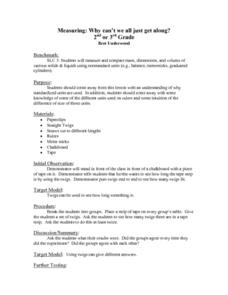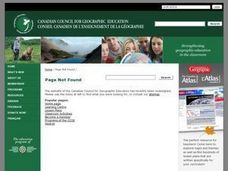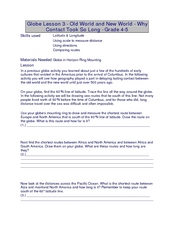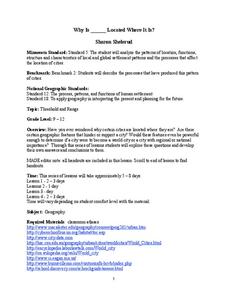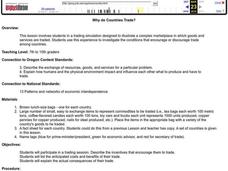Curated OER
Measuring: Why Can't We All Just Get Along?
Students examine why having standardized units of measurement is important. They investigate the use of non-standard measure, twigs, while measuring the piece of tape. Next, they experiment with straws, paper clips, and rulers before...
Curated OER
Why Explore?
Students participate in a class discussion on why people explore. In groups, they create a list of the goods they can acquire and how they can survive if they find food while exploring. Using the Internet, they research famous explorers...
Curated OER
Lesson I - Why is Delaware Called "The First State"?
Students discuss why Delaware is called the First State, research background leading to Delaware's ratification of United States Constitution, complete worksheet on United States Constitution, and work in groups to choose an individual...
Curated OER
Why is the Past Important?
Students explore, examine and study why it's important to study the past and connect this importance with reasons why we should learn from the past and how cultures have changed over the years. They bring an object, photograph or a...
Curated OER
Why Don't Whales Have Legs?
High schoolers are given a variety of materials and are asked to design a heat loss experiment that results in a reasonable explanation of "Why don't whales have legs?" students work with the theory of natural selection.
Curated OER
Snowboarding: Who, What, Where, When, Why?
Students research the Who, What, Where, Why, and When of snowboarding, and then produce a Webzine (magazine) to showcase their new knowledge.
Curated OER
WHY WE AREN'T FILTER FEEDERS
Students describe three methods of obtaining food: scavenging, filter feeding, and hunting. They describe three methods of obtaining food: scavenging, filter feeding, hunting, and list at least two reasons why humans are not considered...
Curated OER
Why do people write?
Learners brainstorm how and why people use writing in their
everyday lives and record answers on chart paper. They create a survey of questions in the computer lab then chart the responses they received from the survey then discuss the...
Curated OER
Why Were the Japanese Interned During World War II?
Seventh graders analyze sources to determine why Japanese-Americans were placed in internment camps during World War II. They discuss the fact that individual rights are sometimes taken by institutions because of fear and paranoia. They...
Curated OER
Why Walk?
First graders listen to the book Yummers. They use the food pyramid to evaluate what Emily Pig ate during her walk and find out why her walk made her sick. They participate in a walking game.
Curated OER
Old World and New World - Why Contact Took So Long
Young scholars use a globe to determine why contact between the old world and the new world took a long time. In this map skills lesson, students analyze routes between regions to determine why it took so long for the old world and the...
Curated OER
Quiz 1B: Using Where, When, What Time and Why
In this questions worksheet, students read 3 short conversations. Students make questions using the information in the sentences. Students will begin the questions with: where, when, what time, or why.
Curated OER
Why Do People Save?
Students identify ways in which they can save and spend their money. They discover why people save money and calculate simple interest. They discuss the costs and benefits of saving.
Curated OER
Why Is ______ Located Where It Is?
Learners discuss the reasons why cities are located where the are. In groups, they identify the physical features that support a city. They determine if those features help or hinder the city to become a major world city. They answer...
Curated OER
Why I Serve
Students explore the concept of philanthropy. In this service learning instructional activity, students consider and share the importance of volunteering. Students participate in a service learning project and reflect on it.
Curated OER
How and Why Has The White House Changed?
Students discuss some of the changes the White House has undergone in more than two centuries. They compare three of the original drawings submitted for the design of the White House, available on the White House Historical Association...
Curated OER
Why do Countries Trade?
Students explore trading among countries. They participate in a trading simulation designed to illustrate a complex marketplace in which goods and services are traded.Pupils use this experience to investigate the conditions that...
Curated OER
World History: Why Civilizations Fall
Young scholars examine factors leading to the demise of ancient civilizations. They list causes that led to the downfall of these societies. Students conduct Internet research and participate in online archaeological investigations.
Curated OER
Why We Chose Our Constitution
High schoolers examine the American plan for government. In this American government lesson, students examine selected Internet websites regarding the Magna Carta, the Articles of Confederation, and the Constitution.
Curated OER
The Why and How of General Terms
Sixth graders find the recurrence relation for simple sequences
construct tables of values for a pattern. They find the value of the general term of a sequence algebraically.
Curated OER
Why Opposites Attract: Observing Magnetic Fields
Students brainstorm background knowledge and any questions they may have about magnetic fields. They investigate the role that William Gilbert had in laying the groundwork for modern experimental science. Students observe magnetic fields...
Curated OER
Why Should We Fix the World?
Students explore the concept of philanthropy. In this service learning lesson, students examine Jewish traditions tikkun olam and malchut shakai. Students discuss how to apply Jewish beliefs in order to help others in the world.
Curated OER
Looking at Labor
Students explore reasons why some jobs are more respected than others. In this jobs lesson plan, students are split into teams and discuss why some jobs are more respected, and are better paid than other jobs in society.
Curated OER
Cause and Effect Relationships in Myths
Fourth graders read the myth Why the Cat Purrs and point out the cause and effect relationships in the myth. For this cause and effect lesson plan, 4th graders write a short paragraph about why the cat purrs.
Other popular searches
- Why Study Classical Music
- Who What When Where Why How
- Why Are Dinosaurs Extinct
- Why Foreign Languages
- Why Study History
- Why Do People Dance?
- Why Stories
- Why Characters Have Actions
- Why Study Global Cultures
- Who What Where When Why
- Why Mosquitoes Buzz
- Why Climate and Crops


